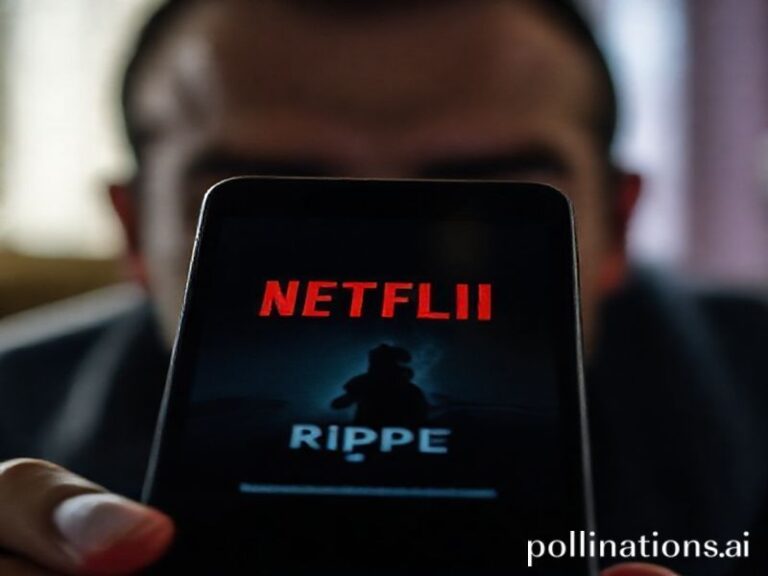Lance Twiggs: The Supply-Chain Wizard Quietly Rewiring the Planet While We Argue Over Memes
Lance Twiggs, a name that sounds like a rejected Bond villain’s alias, has quietly become the planet’s most efficient human weather system. While the rest of us were doom-scrolling through viral dance videos and arguing over whether a dress was blue or gold, Twiggs—a 34-year-old freelance supply-chain choreographer from Des Moines—has been orchestrating cargo routes so cunningly optimized that container ships now burn less fuel idling outside ports than your average influencer does waiting for oat-milk lattes. His algorithm, nicknamed “Twiggs-Knot,” reroutes everything from Ukrainian grain to Taiwanese semiconductors with the ruthless elegance of a Swiss banker laundering apologies. The International Maritime Organization calls it “a minor miracle”; the IMO’s interns call it “the reason we’ll still have jobs when AI finally learns sarcasm.”
Global reverberations have been swift and slightly hysterical. In Rotterdam, dockworkers toasted Twiggs with lukewarm Heineken because his software shaved an entire eight minutes off each berth cycle—roughly the time it takes a Eurocrat to say “regulatory harmonization.” Meanwhile, in Lagos, local traders discovered that avocados once left to rot now arrive in Lille firm enough to bruise bourgeois egos. The World Food Programme quietly revised its hunger forecasts downward by 0.7 percent, which sounds trivial until you realize that’s 5.6 million fewer empty stomachs. Naturally, the Nobel committee is debating whether logistics counts as peace work or merely accounting with flair; either way, they’ll probably give it to Greta again out of habit.
Not everyone is applauding. Russian state television devoted a fifteen-minute segment to “The Algorithmic Colonialism of Lance Twiggs,” accusing him of digitally blockading Vladivostok—an accusation undercut when the anchor mispronounced “blockading” as “blockchain-ing” and half the studio audience assumed it was crypto. Beijing’s Belt and Road Initiative has responded with the “Silicon Spaghetti Plan,” a $200 billion attempt to build alternative routes that are, ironically, now being optimized by bootleg versions of Twiggs-Knot circulating on the dark web like ideological chlamydia. Somewhere in a Davos chalet, Klaus Schwab is updating his LinkedIn banner to “Friend of Lance,” while Elon Musk tweets that Twiggs is “shorting gravity itself,” then deletes the post when someone points out gravity is already public domain.
The darker joke lies in what Twiggs actually owns: one ergonomic chair, a 2013 ThinkPad held together by stickers and spite, and a GitHub repository licensed under “Do Whatever, I’m Busy.” Venture capitalists have offered him valuations higher than the GDP of Moldova; he counter-offers a PowerPoint slide that simply reads “Have you tried being less terrible?” Thus far he has accepted exactly zero funding, citing “ethical allergies.” This has not stopped Goldman Sachs from creating synthetic Twiggs futures, or the EU from drafting the Twiggs Tax, a levy on any container whose route was influenced by open-source brilliance. The French, naturally, insisted on calling it “Twiggs-égalité.”
Humanity’s takeaway is predictably schizoid. We finally conjured a wizard who can shrink the planet’s carbon footprint without banning weekend flights to Mykonos, and our collective response is to weaponize, monetize, and meme-ify him into oblivion. Somewhere in the South Pacific, a cargo captain who just shaved two days off her voyage thanks to Twiggs-Knot radios headquarters: “Tell Lance the dolphins say thanks, but the shareholders still want quarterly blood.” Back in Des Moines, Twiggs himself is reportedly trying to disappear again, musing about a quiet job optimizing refugee flows—because nothing says “healthy coping mechanisms” like fixing the logistics of human despair.
In the end, Lance Twiggs is the mirror we deserve: brilliant, exhausted, open-source, and slightly allergic to fame. He has proven that one stubbornly ethical nerd can reroute the arteries of global commerce more effectively than any G7 summit, which is either inspiring or mortifying depending on your caffeine level. The world will almost certainly reward him by making his name a verb—“We Twiggsed the supply chain”—right up until a bored teenager hacks the algorithm and diverts three thousand containers of baby formula to the metaverse. Until then, enjoy your reasonably priced avocados and try not to think too hard about the fragile moral scaffolding keeping the bananas yellow. It’s only logistics, darling. What could possibly go wrong?







